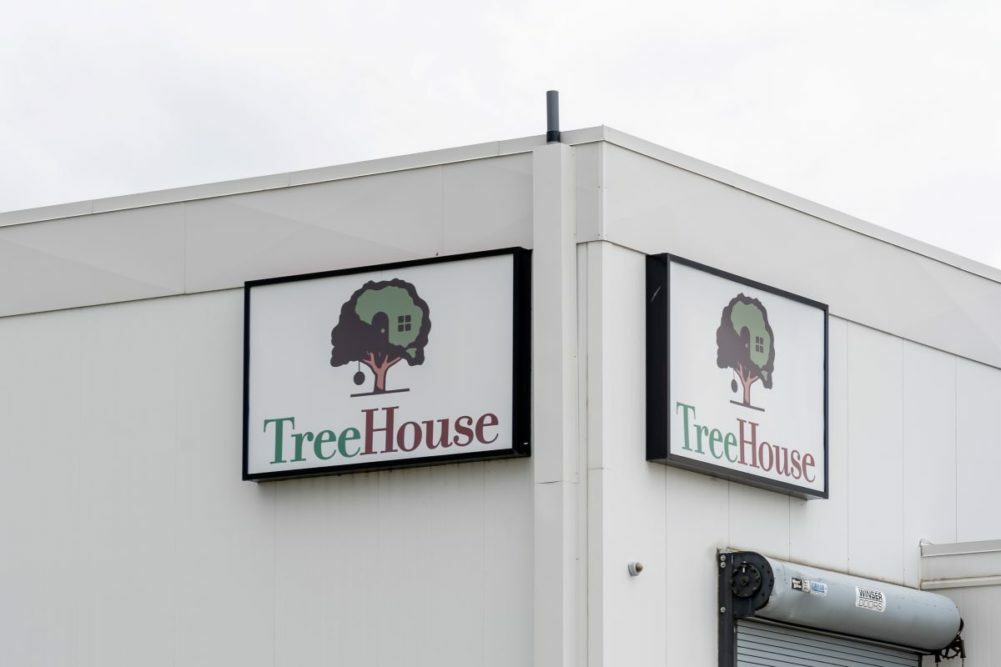OAK BROOk, ILL. — TreeHouse Foods, Inc. was able to overcome a voluntary product recall in its broth business and supply chain disruption with a packaging vendor in its pretzels and cookies businesses late in the quarter to deliver earnings and sales growth in the third quarter. Other factors putting a strain on operations included weaker co-manufacturing and food-away-from-home sales and lower-than-anticipated consumption in select retail categories, particularly retail crackers.
Net income in the third quarter ended Sept. 30 was $7.1 million, equal to 13¢ per share on the common stock, which compared with a loss of $90.5 million in the third quarter of fiscal 2022. Net income from continuing operations totaled $9.8 million in the most recent quarter, which compared with a loss of $12 million in the same period a year ago. Meanwhile, TreeHouse recorded a loss from discontinued operations of $2.7 million in the most recent quarter, which compared with a loss of $78.5 million a year ago, primarily related to the divestiture of a significant portion of its meal preparation business.
Sales for the quarter rose 3.6% to $863.3 million from $832.9 million the year before. The increase primarily was driven by the acquisition of the Coffee Roasting Capability, favorable pricing to recover commodity inflation, and an increase in retail volume, partially offset by declines in co-manufacturing and food-away-from-home volume. Supply chain disruptions, including a voluntary product recall, also had an adverse impact on select categories, TreeHouse said.
Gross profit as a percentage of net sales was 15.9% during the third quarter of fiscal 2023 compared with 16% during the previous year.
“I’d like to reinforce what we see as the key takeaways for the quarter,” said Steven T. Oakland, president and chief executive officer, during a Nov. 6 conference call with analysts. “First, we delivered volume growth in our retail business and outperformed the broader private brands market in the retail channel even in the face of disruptions that impacted the quarter. Second, we are driving margin improvement through TMOS and our supply chain initiatives and are committed to our $250 million savings goal over the next three years. Third, while we have updated our adjusted net sales guidance range … we have reaffirmed our adjusted EBITDA guidance, which puts us on track to exit the year at our targeted $400 million annual run rate. And finally, we are continuing to strategically deploy capital to drive long-term value creation.”
During the quarter TreeHouse closed the sale of its Lakeville, Minn., facility and snack bar business for approximately $61 million to John B. Sanfilippo & Son, Inc.
“The snack bar business was not expected to contribute positive adjusted EBITDA this year,” Mr. Oakland said. “And although bars can be a good consumer category, private brands' penetration in this category is very low. With this divestiture, our portfolio is now more focused on categories where we see the greatest opportunity for the company moving forward.”
Separately, TreeHouse in October reached an agreement to purchase the Bick's pickle business in Canada for a base purchase price of approximately $20 million, relating primarily to acquired inventory.
“This transaction will enhance our capabilities in our pickle category and expands our presence and scale in Canada,” Mr. Oakland said. “TreeHouse has had a co-packing arrangement with Bick’s for many years, and we are pleased to bring this additional margin-accretive volume into our manufacturing network.”
Looking ahead, Patrick M. O’Donnell, chief financial officer, said the company has revised its full-year net sales outlook to approximately 4% to 5% year-over-year growth from 7.5% to 9.5%, or a range of $3.435 billion to $3.465 billion.
He said the updated range reflects the company’s “continuing operations business and removes the net sales associated with the snack bars business.” The revision also takes into account the impact of the voluntary product recall and supply chain disruption, he said.
Mr. O’Donnell reaffirmed TreeHouse’s full-year adjusted EBITDA range of $360 million to $370 million.




